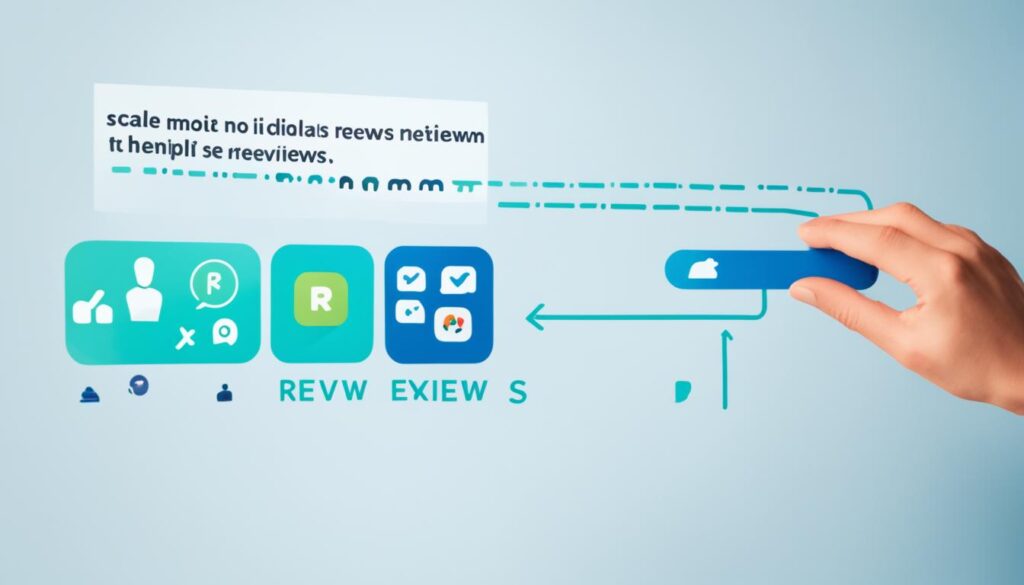In a world where digital interactions are king, Managing Online Reviews and Ratings has become an indispensable facet of Online Reputation Management. It’s a critical exercise in brand sustenance—every Google review, every star rating, every customer comment has the potential to uplift or undermine a business’s presence in the fiercely competitive online arena. Success hinges on adeptly crafted Review Responses, as they not only serve as a testament to customer engagement but also shape the narrative surrounding a business. Proper implementation of Rating Strategies can effectively convert critics into champions and purchasers into loyal patrons.
Learning to navigate the nuanced channels through which customers broadcast their experiences could catapult a company to the forefront of their industry. Yet, this growing sphere of digital dynamics is an area that requires finesse—a combination of personalized attention, a culture of gratitude, and an unwavering commitment to addressing and resolving consumer concerns swiftly and efficiently.
The Impact of Online Reviews on Business Reputation
Understanding the power of customer feedback is paramount in the digital age where online reviews can make or break a business’s reputation. Whether through direct feedback on a company’s website, or through broader platforms such as Google or Yelp, customer testimonials and reviews have become a cornerstone in reputation management strategies. In this environment, learning to use feedback analysis to one’s advantage is both a critical defensive maneuver in handling negative feedback and an offensive play that can underscore a strong reputation when engaging with positive experiences.
Understanding the Weight of Customer Testimonials
Customer testimonials carry significant weight, as they often serve as the first impression for potential customers researching a brand or product. **Positive testimonials** translate into powerful endorsements, radiating trust and quality, thereby catalyzing business growth. Acknowledging and leveraging these positive encounters through strategic marketing can underscore a business’s commitment to customer satisfaction and excellence.
Navigating Negative Feedback for Reputation Repair
Negative feedback, while challenging, provides an invaluable opportunity for **reputation repair**. The strategic insights gained through feedback analysis allow for a detailed understanding of customer discontent, enabling businesses to tailor their resolutions effectively. A professional and empathetic reaction to complaints or concerns not only mitigates harm but can enhance the company’s stature as a responsive and caring entity. Successfully turning detractors into promoters is a testament to a business’s resilience and adaptability in face of adversity.
- Heartfelt acknowledgments of a customer’s poor experience invite rapport and reconciliation.
- **Timely issue resolution** can transform a negative impression into a positive one.
- Engaging in transparent communication reinforces trust and reliability, which are essential elements for a sustainable business reputation.
Managing Online Reviews and Ratings
At the heart of any successful brand lies the ability to deftly manage online reviews and ratings. Such management is the cornerstone of Online Reputation Management (ORM), where the goal is not just to react to customer opinions but to shape the narrative proactively. This process goes beyond mere damage control; it’s about strategically curating an image that resonates with trust and quality.
Rating Optimization is an exacting science, relying heavily on the swift and thoughtful engagement of businesses with their customers. A thoughtfully executed response serves as a testament to a company’s commitment to customer satisfaction and can significantly swing consumer sentiment, solidifying loyalty and encouraging positive word-of-mouth.
Companies championing in ORM, such as Nike, JetBlue, and Starbucks, understand that strong customer support must be both immediate and resonant. Their successes underscore how effective management leads to increased customer return rates and improved online ratings.

Conversely, the lessons learned from United Airlines and Nestlé crystallize the potential for harm when online reviews are mismanaged. These instances signal a clear warning: neglecting ORM can inflict lasting damage to a company’s reputation.
Effective ORM encompasses several strategies, including:
- Monitoring reviews across all platforms to gauge public perception
- Generating sincere responses to both criticisms and accolades
- Employing strategies for Reputation Repair when necessary
- Implementing systems to steer clear of unfounded rumors and controversies
It is in the orchestration of these elements where businesses find the sweet spot for maintaining credibility in the market and safeguarding the value of their brand.
Proactive and strategic online reputation management is not simply a luxury. It is an indispensable asset in a brand’s arsenal to tackle the dynamic battleground of public opinion and emerge victoriously.
Strategies for Encouraging Positive Reviews
Companies that prioritize exceptional customer service are often rewarded with glowing testimonials and high customer loyalty. In the digital age, where online feedback can make or break a business reputation, developing strategies to garner positive reviews is as essential as the quality of the products or services offered. Implementing smart rating strategies and feedback incentives not only distinguishes a brand but also solidifies its position as a customer-centric entity.
Cultivating Exceptional Customer Service
To inspire an influx of positive reviews, businesses must not only meet customer expectations but strive to exceed them. This commitment to excellence in customer service becomes the bedrock for satisfaction and subsequently, the positive online testimonials that follow. Whether it’s ensuring that service representatives are empathetic and solution-oriented, or guaranteeing a seamless user experience, the details matter in forging memorable customer interactions.
- Training team members in effective communication and problem-solving techniques
- Implementing customer feedback loops for continuous service improvement
- Personalizing customer interactions to create an emotional connection with the brand
Incentivizing Feedback Through Engaging Campaigns
To actively receive valuable customer insights, innovative feedback incentives are instrumental. Engaging campaigns that encourage sharing experiences not only drive ratings but also cultivate a narrative of authenticity and transparency around the brand. An effective rating strategy could involve rewards systems, discounts, or exclusive access to new products or services as a thank you to customers for their candid reviews.
- Launching reward-based programs for customers who leave reviews
- Creating contests or giveaways that motivate customers to share their experiences
- Offering special promotions in exchange for honest, constructive feedback
Starbucks stands out as a prime example for successfully deploying a strategy hinged on feedback incentives. Their approach to encouraging customer participation in satisfaction surveys, in exchange for discounts on future purchases, solidifies frequency of visits and secures lasting relationships with their customer base.
“Your feedback not only helps us, it helps other potential customers.”
The voice of the customer is a force that can catapult a business to new heights. Embracing these strategies ensures that customer-centricity isn’t just a buzzword, but a tangible practice that propels a business forward through a virtuous cycle of trust and positive reinforcement.
Review Monitoring and Response Tactics
Maintaining the integrity of your brand in the digital age hinges on the effective monitoring and managing of online reviews. This not only shapes public perception but also directly influences consumer decision-making. As such, a robust strategy leveraging review monitoring and review response, complemented by real-time alerts and a consistent approach, becomes the linchpin for businesses aiming to build and sustain a sterling reputation.
Employing Real-Time Alerts for Swift Action
In today’s fast-paced online sphere, the immediacy of response to customer feedback can make or break a brand’s reputation. By implementing real-time alerts, companies ensure no review goes unnoticed. This approach satisfies the client’s desire for prompt acknowledgement and fosters a sense of being valued and heard, which is paramount in cultivating trust and maintaining customer relationships.

Developing a Consistent Approach for Responding to Reviews
A standardized response protocol is critical for sustaining the credibility of your brand across multiple platforms. A consistent approach to customer interactions demonstrates a cohesive brand voice and identity. To this end, scripted responses are tailored, empathetic messages reflecting the brand’s values and commitment to quality customer service.
- Consistent voice in review responses reinforces brand personality
- Tailored interactions show attentiveness to each customer’s unique experience
- Review monitoring tools track and analyze feedback trends strategically
Embracing these sophisticated tactics in review monitoring and engagement, your brand can continually elevate its customer service quality, ensuring a proactive, responsive online presence that resonates positively with your audience.
Advanced Feedback Analysis to Refine Business Practices
In an era where data is king, businesses have discovered that Feedback Analysis is not just a tool for measuring satisfaction, but a compass that directs strategic refinement and innovation. Harnessing the full spectrum of customer feedback – from ecstatic praise to constructive criticism – companies are now equipped to make calculative enhancements to their services and products, thereby honing their competitive edge.
Utilizing Analytics for Insightful Rating Optimization
To achieve Rating Optimization, it’s essential for businesses to deploy analytics tools that transform raw data into actionable insights. By analyzing customer ratings and the sentiments behind them, patterns begin to emerge, illuminating the areas that demand attention and those that warrant commendation. Advanced analytics allow for not just reactionary changes but the anticipation of customer needs, leading to a preemptive improvement of the customer experience.
Leveraging Customer Insights for Continuous Improvement
Continuous Improvement is the hallmark of a dynamic business, and Customer Insights are the fuel for this relentless pursuit of excellence. By deeply understanding the customer’s voice, businesses refine their practices, tweak their strategies, and innovate, ensuring they remain relevant in a fast-paced market. It is through the meticulous study of feedback that companies can adapt and evolve, resonating with their audience in a way that is both pertinent and progressive.
- Examining feedback trends to anticipate customer needs
- Turning negative feedback into a positive by identifying opportunities for change
- Using positive ratings as a benchmark for successful practices and customer satisfaction
- Adapting business models and strategies based on authentic customer feedback
As businesses continue to navigate the nuanced landscape of customer relations, those who treat Feedback Analysis as a staple of their strategy will lead the charge in their respective industries, setting benchmarks for others to aspire to.
Conclusion
In an era marked by the digital consumer’s voice, the narrative of a brand is often written through online discourse, chiefly through reviews and ratings. A strategic approach to Review Management powerfully influences an enterprise’s online presence, directly affecting their credibility and reach. Shifting from a purely reactive stance to a proactively fashioned Reputation Management agenda enables organizations to truly master their digital narrative and lay the foundation for Long-Term Success.
Building a Strong Online Presence Through Review Management
Amplifying a business’s cyber footprint depends largely on how it manages customer feedback. By creating a transparent, responsive communication channel, a company not only reinforces its accessibility but also solidifies its trust with consumers. The efficacy of Review Management, when executed consistently, fosters a robust online community around a brand, propelling both its reputation and its resonance within the target audience.
Securing Long-Term Success with Proactive Reputation Management
Engaging in Proactive Reputation Management extends beyond mitigating less favorable feedback; it is about cultivating an environment where feedback is actively sought, critically analyzed, and skillfully utilized to propel business innovation and service refinement. Establishing such a diligent ritual of self-improvement not only positions a company as adaptable and resilient but also sets the stage for enduring market leadership and success, irrespective of the fluctuating digital landscape. In essence, the targeted and intelligent application of these principles constitutes the new cornerstone for enduring brand prosperity.
FAQ
Q: How can managing online reviews and ratings improve my business’s reputation?
A: Effectively managing online reviews and ratings can greatly enhance your business’s reputation by showcasing your responsiveness and dedication to customer satisfaction. It helps to build trust with potential customers, displays transparency, and can also lead to improved services through feedback analysis.
Q: What is the importance of customer testimonials for a business?
A: Customer testimonials are crucial as they act as personal endorsements and can significantly influence potential customers’ purchasing decisions. They provide authentic proof of customer satisfaction and can enhance the credibility and appeal of your business.
Q: How should a business navigate negative feedback for reputation repair?
A: Negative feedback should be navigated with professionalism and empathy. It’s important to acknowledge the issue, apologize when necessary, and provide a solution. Reputation repair involves actively working to resolve customer complaints and using the feedback to make structural improvements to your products or services.
Q: What strategies can businesses use to encourage customers to leave positive reviews?
A: Businesses can encourage positive reviews by providing exceptional customer service, exceeding expectations, and incentivizing customers to share their experiences through rewards or recognition. Effective communication and follow-up after a purchase can also prompt customers to share their positive experiences.
Q: Why is review monitoring crucial for businesses?
A: Review monitoring is critical as it allows businesses to keep a close watch on what customers are saying in real-time. This enables swift responses to feedback, both positive and negative, showing customers that their opinions are valued and taken seriously.
Q: How can a consistent approach to responding to reviews benefit a business?
A: A consistent approach ensures that the brand message remains cohesive across all platforms, and every customer receives the same level of care and attention. Consistency in responses can strengthen a business’s reputation for reliability and customer-focused service.
Q: How does utilizing analytics help with rating optimization?
A: Utilizing analytics allows for insightful rating optimization by identifying trends, pinpointing areas for improvement, and understanding customer preferences. This data-driven approach helps businesses to fine-tune their offerings and customer service, resulting in better ratings.
Q: In what ways can leveraging customer insights lead to continuous improvement?
A: Leveraging customer insights can inform strategic decision-making and foster innovation. By understanding and acting on customer feedback, businesses can continually improve their products, services, and customer experience, leading to sustained growth and success.
Q: How can proactive reputation management secure long-term success?
A: Proactive reputation management involves regularly engaging with customers, monitoring reviews, and actively seeking feedback. This strategic approach preemptively addresses issues before they escalate and continuously improves the customer experience, leading to a strong, positive online presence and enduring business success.
Q: Why is building a strong online presence through review management important?
A: Building a strong online presence through review management is important because it enhances visibility, accessibility, and trustworthiness in the eyes of consumers. This presence can drive traffic, foster customer loyalty, and distinguish your business from competitors in the digital marketplace.




